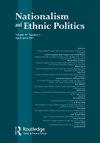从政治共识到政治冲突再到政治冲突:加利西亚的语言公共政策(1989-2020)
IF 0.7
Q3 ETHNIC STUDIES
引用次数: 0
摘要
语言公共政策是加利西亚政治中的一个关键问题。它的象征性用途已被证明是党派竞争中的一种强大的政治资源。本文分析了加利西亚三个主要政党的策略,以检验关于政治竞争与语言公共政策如何联系的三个相关假设:(1)敌对语言公共政策是反对党和竞选活动的有效策略,但(2)一旦执政,它就成为一个主要的政策问题,无论是民族主义政党还是非民族主义政党;(3)倡导语言之间的谨慎平衡是执政后语言公共政策的最佳政治策略。西班牙和加利西亚右翼政党人民党(Popular party - pp / ppdep)在1989年至2005年执政期间,战略性地推动了基于西班牙语(卡斯特利亚语)和加利西亚语(加莱戈语)之间所谓平衡的语言公共政策,以赢得民族主义保守派选民,并划分民族主义政治空间。在此期间,民族主义的加莱戈民族主义集团(BNG)和社会主义的加利西亚社会主义党(PSdeG/PSOE)的反对派都支持对加莱戈语的积极歧视。2005年的政治变革改变了他们的立场;人民党主张加强对卡斯特利亚诺的保护,而新的民族主义和左翼政府则主张加强加莱戈的地位。人民党在2009年重新执政后,再次改变了立场。本文章由计算机程序翻译,如有差异,请以英文原文为准。
From Political Consensus to Political Conflict and Back Again: Language Public Policy in Galicia (1989–2020)
Abstract Language public policy is a key issue in Galician politics. Its symbolic uses have proven to be a powerful political resource in partisan competition. This article analyzes the strategies of the three main Galician political parties to test three related hypotheses about how political competition and language public policy are linked: (i) adversary language public policy works as a valid strategy for opposition and electoral campaigning, but (ii) it becomes a major policy problem once in office, both for nationalist and non-nationalist parties, and (iii) advocating for careful balance between languages is the best political strategy for language public policy once in office. The Spanish and Galician right-wing party, Popular Party—PP/PPdeG—which was in office between 1989 and 2005, has strategically promoted language public policies based on an alleged equilibrium between the Spanish language—Castellano—and the Galician language—Galego—to gain nationalist conservative voters and to divide the nationalist political space. During this period, the nationalist—Bloque Nacionalista Galego (BNG)—and socialist—Partido dos Socialistas de Galicia (PSdeG/PSOE)—opposition have supported positive discrimination for the Galego language. Political change in 2005 switched their positions; PP stood for increasing protection for Castellano, while the new nationalist and left-wing government promoted a stronger status for Galego. PP’s return to office in 2009 has switched the positions again.
求助全文
通过发布文献求助,成功后即可免费获取论文全文。
去求助
来源期刊

Nationalism and Ethnic Politics
ETHNIC STUDIES-
CiteScore
1.30
自引率
0.00%
发文量
30
期刊介绍:
Nationalism & Ethnic Politics explores the varied political aspects of nationalism and ethnicity in order to develop more constructive inter-group relations. The journal publishes case studies and comparative and theoretical analyses. It deals with pluralism, ethno-nationalism, irredentism, separatism, and related phenomena, and examines processes and theories of ethnic identity formation, mobilization, conflict and accommodation in the context of political development and "nation-building". The journal compares and contrasts state and community claims, and deal with such factors as citizenship, race, religion, economic development, immigration, language, and the international environment.
 求助内容:
求助内容: 应助结果提醒方式:
应助结果提醒方式:


